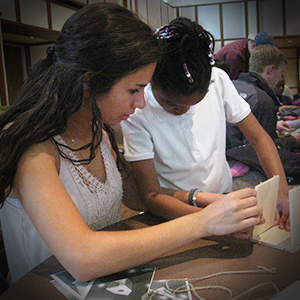Inspiring an imperfect world

photo courtesy of College Mentors for Kids
Mentors For Kids facilitates one-on-one relations for at-risk youth
In a perfect world, every child has equal opportunities to succeed. Every child graduates from high school and goes on to earn a postsecondary degree in that perfect world, too. But a majority of children in America—51 percent—live at or below the poverty line, making it significantly harder to reach those goals.
College Mentors for Kids recognizes that it’s not a perfect world, but believes that every child deserves a chance. For 20 years the organization has paired at-risk youth (1st-6th grade) with a college mentor who teaches them about higher education and careers, culture and diversity and community service. College Mentors for Kids hopes that by allowing the children, called “little buddies”, to spend two hours on a college campus with a mentor, it will increase the likelihood of his or her of obtaining a postsecondary education.
And it has.
The organization recently surveyed former little buddies and found that 80 percent graduated from high school and 76 percent pursued postsecondary education. It also found that most little buddies stay local after earning that degree and 48 percent said the household they anchor has an annual income of $35,000—above the poverty line.
College Mentors for Kids CEO, Dennis Trinkle, says from an economic and development standpoint, the fact that former little buddies report anchoring a home above poverty level is an indication of the program’s ability to trigger change. He adds, “We know they’re changing the work and income patterns of their families as adults.”
Though College Mentors for Kids has a primary focus on youth, the mentors also develop invaluable skills. Every College Mentors for Kids chapter (now in eight states and 33 colleges) is 100 percent student-led, with support from headquarters as needed.
That means it’s up to student leaders to recruit mentors, fundraise for their chapter and plan a 2-hour weekly activity. It’s expected that time spent on campus introduces little buddies to a world they never knew existed or a job they never knew they could do, all while building confidence and motivation.
“It’s hard to believe how small these kids’ worlds are,” says Trinkle, “These exercises are a really big deal.”
As the college mentors create memorable and life-changing moments for their little buddies, their own lives change. For many mentors the experience of working with children alters their entire career trajectory—often with a new interest in studying education or perhaps joining the Peace Corps. For other mentors it instills a life-long desire to give back, and to encourage others to do the same.
The former president of Ohio State University’s chapter provides an ideal example of how College Mentors changes mentors, too. Trinkle says the he was promoted to a director of finance at his $2.6 billion global company just two years after graduating and has encouraged the company to think more about giving back to its community—a great success story in Trinkle’s mind.
“We’ve seen time and time again that when you give them a platform for doing great things they’ll surprise you,” says Trinkle of the little buddies and college mentors.
The College Mentors for Kids model touches students at two pivotal life stages— early childhood and college—that can influence the lives of little buddies and mentors alike. And as the program’s survey demonstrates, for many at-risk students, it just may be the perfect solution.
Central Indiana Community Foundation has made college readiness and success a priority through its Community Leadership Initiatives and partners with organizations such as College Mentors for Kids that are united in their efforts to increase college persistence. For more information about opening a fund to support education, contact Rob MacPherson, Vice President for Development and Philanthropic Services at robm@cicf.org or 317.631.6542 x 199.






Leave A Comment